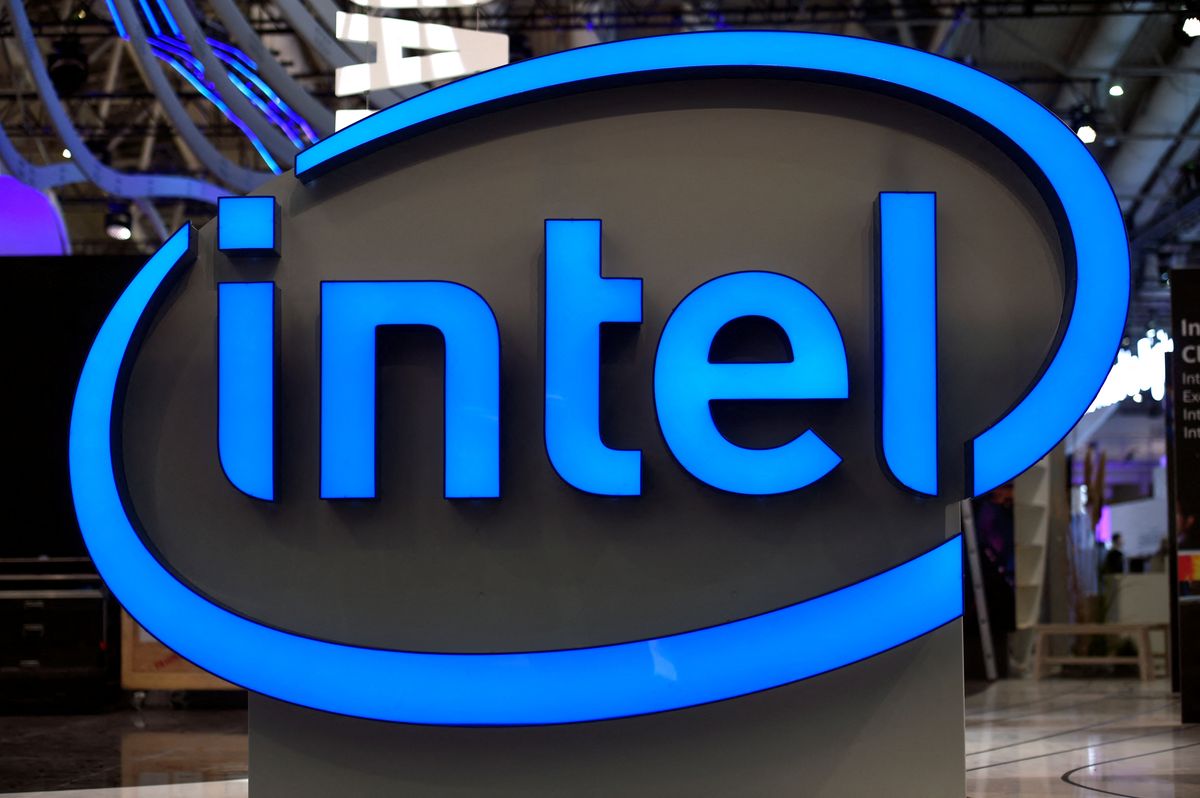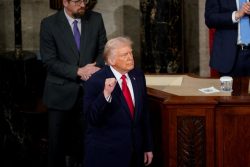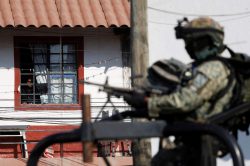
Intel’s logo is pictured during preparations at the CeBit computer fair, which will open its doors to the public on March 20, at the fairground in Hanover, Germany, March 19, 2017.
11:58 JST, December 3, 2024
SAN FRANCISCO (Reuters) – Intel Chief Executive Pat Gelsinger has been forced out less than four years after taking the helm of the company, handing control to two lieutenants as the faltering American chipmaking icon searches for a permanent replacement.
Gelsinger, who resigned on Dec. 1, left after a board meeting last week during which directors felt Gelsinger’s costly and ambitious plan to turn Intel around was not working and the progress of change was not fast enough, according to a person familiar with the matter. The board told Gelsinger he could retire or be removed, and he chose to step down, according to the source.
His departure comes well before the completion of his four-year roadmap to restore the company’s lead in making the fastest and smallest computer chips, a crown it lost to Taiwan Semiconductor Manufacturing Co, which makes chips for Intel rivals such as Nvidia.
Under Gelsinger, Intel, which was founded in 1968 and for decades formed the bedrock of Silicon Valley’s global dominance in chips, has withered to a market value more than 30 times smaller than Nvidia, the leader in artificial intelligence chips.
Gelsinger in 2021 inherited a company rife with challenges that he compounded. Setting lofty ambitions for manufacturing and AI capabilities among major clients, Intel ultimately lost or canceled contracts under his watch, and was unable to deliver the promised goods, according to a Reuters special report in October. He made optimistic claims about prospective AI-chip deals that exceeded Intel’s own estimates, leading the company to scrap a recent revenue forecast about a month ago.
Bloomberg earlier reported on the circumstances surrounding Gelsinger’s retirement.
Gelsinger, 63, has assured both investors and U.S. officials, who are subsidizing Intel’s turnaround, that his manufacturing plans remain on track. But the full results will not be known until next year, when the company aims to bring a flagship laptop chip back into its own factories.
Shares of the company fell 0.5%. The stock has lost more than half of its value this year, and it was replaced last month by Nvidia on the blue-chip Dow Jones Industrial Average index . Rival Advanced Micro Devices climbed 3.6%, as the PHLX Semiconductor Index rose 2.6%.
The company named Chief Financial Officer David Zinsner and senior executive Michelle Johnston Holthaus as interim co-chief executive officers while its board conducted a search for a new CEO. The moves come less than a week after U.S. officials gave $7.86 billion in subsidies to Intel.
The board has formed a search committee for Gelsinger’s successor.
“While we have made significant progress in regaining manufacturing competitiveness and building the capabilities to be a world-class foundry, we know that we have much more work to do at the company and are committed to restoring investor confidence,” Frank Yeary, independent chair of the board, said in a release.
Intel’s communications chief, Karen Kahn, is also planning to leave the company, according to two people with knowledge of the situation.
SPENDING SPREE Gelsinger announced his turnaround plan in July 2021, when the company was already troubled by years of missteps in its manufacturing operations, and then embarked on a spending spree. It started construction on a $20 billion suite of new factories in Ohio and hiring a larger workforce – at 132,000 – than Intel had ever maintained even during its days as the biggest player in the chip business.
But the spending coincided with a post-pandemic collapse in the market for laptops and PCs, which in turn sank Intel’s gross margins well below historical norms and depressed its stock price, sparking takeover interest in the company.
The spending eventually forced Gelsinger to come up with a menu of layoffs and potential sales and spinouts of assets.
“The stock lost more than 60% under his tenure, so this shouldn’t have come as a very big surprise,” said Ryan Detrick, chief market strategist for investment advisory firm Carson Group.
“New leadership is needed to turn things around and it is safe to say that any of his major strategic decisions are on the chopping board, including the move to focus on being a contract manufacturer.”
Gelsinger also failed to field an effective AI chip challenger to Nvidia, which began its march toward becoming a $3 trillion company by powering services such as ChatGPT.
“At the end of the day, you need leading-edge products, innovation, and execution, none of which we saw during Pat Gelsinger’s reign,” said Hans Mosesmann, an analyst at Rosenblatt Securities.
Gelsinger’s turnaround plan centered on Intel becoming a major player in contract manufacturing for others, a business model called a “foundry” in the chip industry. Intel has announced a handful of foundry customers such as Microsoft and Amazon.com, but neither would bring to Intel’s factories the huge volumes of chips needed to ensure the factories’ profitability.
The spending spree, coupled with the lack of tangible progress in the company’s foundry, created tension on the board of directors, causing Lip-Bu Tan, a board member who himself had turned around a faltering firm in the chip industry, to leave over disagreements with Gelsinger’s strategy.
Top Articles in News Services
-

Survey Shows False Election Info Perceived as True
-

Hong Kong Ex-Publisher Jimmy Lai’s Sentence Raises International Outcry as China Defends It
-

Japan’s Nikkei Stock Average Touches 58,000 as Yen, Jgbs Rally on Election Fallout (UPDATE 1)
-

Japan’s Nikkei Stock Average Falls as US-Iran Tensions Unsettle Investors (UPDATE 1)
-

Trump Names Former Federal Reserve Governor Warsh as the Next Fed Chair, Replacing Powell
JN ACCESS RANKING
-

Producer Behind Pop Group XG Arrested for Cocaine Possession
-

Japan PM Takaichi’s Cabinet Resigns en Masse
-

Man Infected with Measles Reportedly Dined at Restaurant in Tokyo Station
-

Israeli Ambassador to Japan Speaks about Japan’s Role in the Reconstruction of Gaza
-

Videos Plagiarized, Reposted with False Subtitles Claiming ‘Ryukyu Belongs to China’; Anti-China False Information Also Posted in Japan























